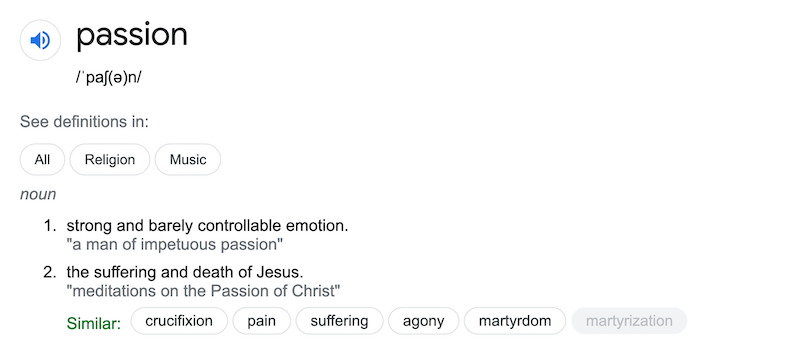"Find something you love doing, and you'll never have to work a day in your life."
I am sure we have all heard something or other along the same lines. Most of us have been conditioned from a young age to find something we are passionate about. We've all been in a classroom where the teacher asks us, "What do you want to be when you grow up?"
What do you want to be when you grow up?
When I was a kid, the question didn't matter much. The easy way out was saying a doctor, an engineer, or a teacher. But as a 17-year-old, the question would keep me up at night. I thought that the subject I chose for my undergraduate studies would be my career for the rest of my life. This is true to some degree, which is probably why I had such a hard time deciding on a subject.
The trouble was that I simply didn't know what I wanted to be doing for the rest of my life.
It was probably around that period when I first started thinking about finding a passion. It seemed so important to me that I would spend days, weeks, and months thinking about what I was passionate about. Did I like the arts and crafts enough to do one art project or another every other weekend? Yes. But did I want to be an artist? Who knows... I didn't have enough resources to picture the life of an artist at the time. I also wanted to write stories; could I pursue becoming an author?
I had difficulty figuring out my passion because, as it turns out, passion is not fact; passion is a feeling. And feelings change constantly. Even Google defines passion as a strong and barely controllable emotion.

Does it seem rational to base your career and life decisions on a "barely controllable emotion"? Seems more likely to be a reason for something that will take you to jail...
I ended up studying Computer Science because it was the safest option for me as my cousin was studying the same thing, and my friends were also joining the IT bandwagon. It turned out to be a great decision as it was a pretty versatile degree that could lead to multiple career options. But to my surprise, this would be true for most degrees.
Does Passion Matter?
So here is what I think the flaw is with "Finding your Passion". First, it severely limits your options. You have to decide on finding your one destined purpose. It blocks out so many other options that you could have been great at simply because you didn't know about them or didn't have time to explore them further.
Second, it is actually quite unrealistic and even elitist. Most people have too many interests and things that they are passionate about. On the other hand, only the rich have the freedom to ponder their passions and delve into them and live the life of a dilettante. People have to do menial jobs like cleaning houses for a living. What about their passions and dreams? Job security was another reason I was afraid to study Fine Arts and why I chose Computer Science as my undergraduate degree.
Third, focusing on a single passion sets you up for failure. Because even if you do find your passion, you may not be as good at it as you thought. Worse, you might lose interest after you've started working – which would be a crushing blow. You won't know what you are passionate about unless you do it. And even after you've found your passions, your feelings are subject to change. So what is the point?
Your career is something you build, not something that will come to you naturally. Do you think people become successful musicians because they are passionate about singing? Partly yes, but also more likely because they have spent hundreds of hours practising their vocals and honing their skills. The more time you spend doing something, the better you get at it.
Of course, the best possible scenario is one finding a passion, liking the work, and enjoying it for the rest of their lives. If that's what you've done, that's great! But not everyone is lucky enough to find that luxury.
If you haven't figured out your passion, then it's absolutely fine. It is okay to take things slow and experiment. Try your hand at lots of things and see what things you want to learn and also what makes you decent money. Don't wait for your passions to hit you on your head!
Your passion should follow you, not lead you.
Thanks for reading and catch you in the next one!
